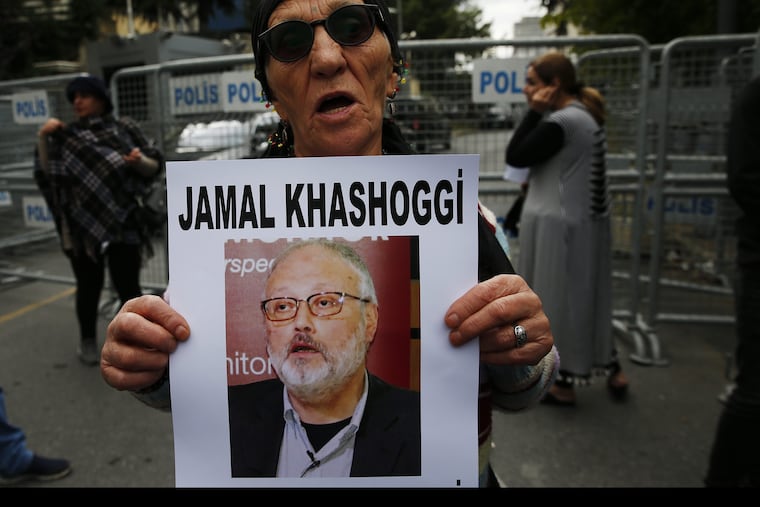Jamal Khashoggi affair highlights what happens when America abdicates role as free press defender | Trudy Rubin
If Trump fails to press Saudi Crown Prince MBS for an accounting of what happened to Jamal Khashoggi, he will add to the impression that the U.S. no longer cares when journalists are murdered abroad.

Here's the most astonishing thing about the disappearance of Jamal Khashoggi, the Saudi journalist-in-exile and Washington Post columnist, who entered his country's consulate in Istanbul a week ago and never came out.
Whoever gave the order to snatch him – and all bets are that it came from Saudi Crown Prince Mohammed bin Salman — assumed a renowned journalist could be kidnapped or killed with few repercussions.
In a foreign country.
This stunning assumption tells you much about the growing threats to independent journalism in an era of conspiratorial websites, populist hysteria, and dictatorial crackdowns – and the constant Trumpian drumbeat that critical journalists are the "enemy of the people."
The Khashoggi affair is a grim illustration of how the risk to journalists increases worldwide when America abdicates its role as global defender of a free press.
The details of this story so far are shocking and still murky. Turkish officials have said they think Khashoggi was murdered inside the consulate and his dismembered body removed by a Saudi hit squad. There is also the possibility that the journalist was drugged and smuggled out in two black Saudi diplomatic limos that entered and left the consulate the day Khashoggi visited. After all, other critics and even dissident princes have been abducted from abroad and jailed since MBS (the colloquial name for the crown prince) rose to power.
How could this happen?
The mild-mannered Khashoggi, was initially a supporter of MBS's bold reform plans, became disillusioned when the prince began jailing intellectuals, businessmen, bloggers, and writers. Even though the prince loosened restrictions on women, and permitted them to drive, he jailed several female activists, lest they take credit. And MBS's foreign adventures, notably a Yemen war in which Saudi planes (with U.S. help) were devastating civilians, were a disaster.
So Khashoggi attempted the role of constructive critic. Citing himself and other dissidents, he wrote: "We want our country to thrive. We are not opposed to our government and care deeply about Saudi Arabia. Yet we are the enemy." He begged MBS to use diplomacy to end the brutal Yemen war.
This apparently was too much for the prince to swallow. But why might a Saudi leader assume he could carry out such a brazen move without tarnishing the Saudi image? Perhaps because he was a close friend of first son-in-law Jared Kushner, or because he had been adulated by President Trump, who considers the Saudis to be his closest Arab Mideast ally.
And perhaps because Trump is so cozy with other leaders who are hostile to journalists and is himself a fierce critic of mainstream media. Gone is the time when the United States stood in defense of press freedoms. Trump's relentless attack on U.S. news outlets that critique him, as "fake news" or "enemies of the people," has had a negative impact worldwide.
>> READ MORE: Trump hitches Mideast policy to a reckless prince | Trudy Rubin
As the late Sen. John McCain put it: "These efforts are being closely watched by [repressive] foreign leaders who are using his words as cover."
Maybe that includes the Saudi crown prince.
Consider these stats: At least 21 journalists worldwide were jailed on "fake news" charges in 2017, according to the Committee to Protect Journalists; the term has become a convenient club for leaders in autocracies, and even some supposed democracies, such as Poland. Indeed, last summer, while delivering a speech on Western values in Warsaw, Trump pledged to team up with Poland's president to fight "fake news."
Even more damning, Trump has embraced authoritarian leaders who openly threaten journalists with murder, such as Filipino leader Rodrigo Duterte, or who silently tolerate such murders, such as Vladimir Putin. Twenty-eight journalists have been killed in Russia since Putin became president, and three more were recently murdered in the Central African Republic, where they were investigating a Russian mercenary operation run by a pal of Putin's.
>> READ MORE: Trump is suffering from a bad case of autocrat envy | Trudy Rubin
Yet Trump has repeatedly defended the Russian leader, insisting "It has not been proven that he's killed reporters."
In this ugly climate, three journalists were recently murdered in Euopean Union nations: Malta, Slovakia, and Bulgaria. In the first two cases, brave reporters were investigating corruption linked to high government officials.
So it isn't surprising that it took six days for Trump to say he was "concerned" about Khashoggi's disappearance and for Secretary of State Mike Pompeo to issue an anodyne statement. "If this had been Iran, would there have been this silence [until now]?" asked Robert Mahoney, deputy executive director of the Committee to Protect Journalists. Not a chance.
So far U.S. journalists have been spared, apart from the terrible murder of five people by a disturbed man at the Capital Gazette newsroom in Annapolis. But the anti-media rhetoric from the White House encourages the deranged, and death threats have been forthcoming, notably to the Boston Globe.
>> READ MORE: After Maryland shooting, Trump must quit embracing autocrats who squash the press | Trudy Rubin
The Khashoggi affair is a warning.
When the United States abandons its role as defender of the free press, the risk grows to American journalists, and those in other countries. If Trump fails to press MBS for an accounting, he will add to the impression that the United States no longer cares when journalists are murdered. It could happen here.
A previous version of this column referred to Istanbul as the capital of Turkey. The capital of Turkey is Ankara. A correction has been made to reflect this.